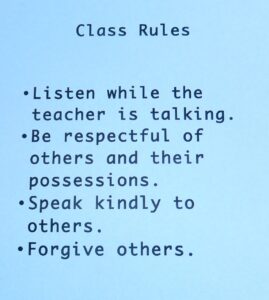 I’m not sure when it started or if it has always been this way. Volunteer teachers are afraid to hold the children in their classes accountable for their behavior. If asked, these teachers will explain they fear that if they correct a child, the child will stop coming to church.
I’m not sure when it started or if it has always been this way. Volunteer teachers are afraid to hold the children in their classes accountable for their behavior. If asked, these teachers will explain they fear that if they correct a child, the child will stop coming to church.
The reality is children crave limits and boundaries. Not those that are similar to military bases, where the joy and curiosity of childhood is stifled. Children do, however, want to know what the rules are and that they will be enforced consistently.
They want to know if they are having trouble controlling their own behavior an adult will help them find a way to do what they should be doing. They want to know their Bible classes are a safe place where they don’t have to worry about getting hurt either physically or by another child’s cruel words. They want to be able to enjoy those lessons and activities you have planned so carefully.
Often the classes with the youngest children are the most out of control. No one seems to know what can really be expected as appropriate behavior from children. They may base it on how they were raised or how they think children should be raised or not address it at all in fear of offending someone.
Unfortunately, our Bible classes are sometimes the only place children learn about God’s principles and commands. Expecting age-appropriate behavior from the children in our classes helps reinforce the types of behaviors God wants from them. Consideration, respect and love should be modeled not only by you but also by every student in your class.
In my next post, I will share with you what the experts say are the behaviors and skills you can expect from the young children in your class. You may be surprised to find expecting appropriate behavior from your students actually makes them more excited about coming to your class – not less.




